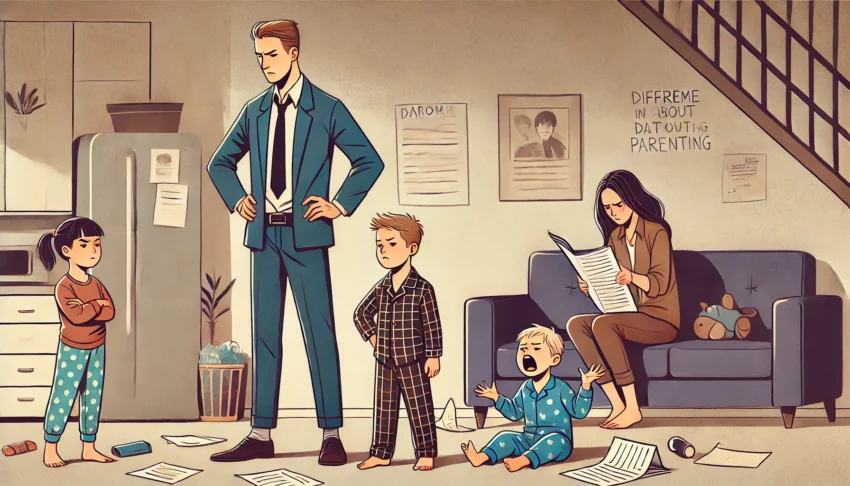In all the history of poor parenting, there has never been an article with more cope than this one. THIS is the problem with the modern American mother—there are too many places happy to excuse her inferiority. This article highlights this issue perfectly, excusing the fact that, according to the article, “children are 800% worse when their mothers are around.” This sentiment resonates with many mothers desperate to excuse themselves from being good at being a mom.
Modern American mothering is, in my opinion, at an all time historic low and our culture is all too willing to offer them excuses rather than solutions. Articles like these only serve to perpetuate the problem by validating ineffective parenting practices. This piece aims to dissect these arguments, provide a personal perspective, and advocate for a return to stricter, more effective parenting methods from mothers, so that they can achieve the response that American fathers do.
Personal Experience
I lived this. My kids have their act together around me. The article above says that’s because they have to hold their emotions in check and process them when I am around. GOOD! That’s part of growing up—internalizing and processing your issues instead of making them everyone else’s problem. This is a natural part of growing up and, if they are held to that standard, they quickly grow into it.
In my home, there is one simple rule: You may not enter the main part of the house without putting on your clothes. Their rooms are up a long flight of stairs. One day, I explained the rule to them before bed and let them know that tomorrow, we would start the rule. My wife and I agreed on this and, the next day, when they came downstairs naked I waited at the bottom of the stairs for them. I reminded them of the rules and blocked them from coming into the living room. They whined, they complained, they acted like kids, and then they went back upstairs and put on matching outfits. It was freaking adorable!
And, to this day, when it’s just me and the kids, this rule is followed without complaint. The kids get dressed, then come downstairs, and we begin our day. Sometimes the big one helps the little one. Most of the time it’s not even an issue we discuss – they know the rule, and they follow it. I can trust it. I don’t have to wait at the bottom of the steps anymore because they have internalized the rule and know they must follow it.
However, the scenario drastically changes when my wife is involved. It becomes a nightmare Every. Single. Time. There are fights, yelling, tears, and occasionally even hitting because my wife doesn’t enforce this rule. I get caught up in it because I hold the rule, regardless of her behavior. She can excuse whatever she wants – I will not excuse the ONE rule I have.
Her excuses range from “Oh, but it is just so great cuddling with them and we won’t get much longer to do it!” to “Well, she was really mad this morning and I just couldn’t!”
This lack of consistency and discipline undermines the structure that children need. When my wife ignores the rules it sends a clear signal to our kids – The rules are only for when dad is around. This creates confusion and instability, leading to chaotic mornings that spin the entire family out, often for the entire day.
Critique of Modern Parenting Articles
Article, after article, after article does this excuse. I’ve already mentioned the one from Creative Healthy Family. But we also have the Awareness Act article claims that children act worse around their mothers because they feel more comfortable being their “true selves.” So, great, you’re an amazing mom who is raising a child whose “True Self” is to ignore you and do whatever they want. It normalizes and even celebrates poor behavior, rather than teaching mothers how to teach children to develop self-control and respect.
The trend continues with articles from sources like Moms.com, which argue that children whine more around their mothers because they feel more comfortable expressing their emotions. This perspective is dangerously permissive, encouraging mothers to tolerate and even embrace whining and tantrums as signs of emotional health.
Romper.com takes it a step further, suggesting that it is normal for the primary caregiver to receive the worst behavior from their children. This narrative is not only false but also damaging. It excuses poor parenting practices and lowers the standards for acceptable child behavior for mothers. “Your kid is great for everyone but you? Great!!! You’re the best mom ever!!!”
These articles collectively paint a picture of modern American mothering that is far too forgiving of bad behavior and inconsistent parenting. They provide mothers with easy outs instead of challenging them to uphold higher standards of discipline and respect.
General Criticism of Modern American Parenting
The broader issue with modern American mothering lies in the cultural shift towards permissiveness and excuses. Traditional parenting values emphasized discipline, respect, and personal responsibility. However, contemporary practices often prioritize emotional expression at the expense of these crucial principles.
This shift has led to a generation of children who are less equipped to handle adversity and more prone to acting out. The acceptance of poor behavior as a sign of emotional health is a dangerous trend that undermines the development of well-rounded, respectful individuals.
Mothers must resist the temptation to coddle and excuse their children’s bad behavior. Instead, they should enforce consistent rules and teach their children the importance of self-control and accountability. This approach will not only improve behavior but also foster a healthier, more respectful parent-child relationship. Moreover, it makes it easier to be a mom! Honestly, it’s really easy for me to be a dad because, and I cannot stress this enough, my children listen to me!!! When I say do something, they do it. It’s on me as a parent to only tell them to do things that are in their best interest and, over time, they have learned that’s how I roll. They trust my guidance and, even when they don’t understand, they know I am the one that sets the boundaries that keep them safe and happy. Thus, when I say do something they just do it and, occasionally, ask why. I explain it, they think about it, understand, and on we go! This is how parenting is supposed to work.
Conclusion
In conclusion, the problem with modern American parenting, particularly among mothers, is the widespread acceptance of excuses for poor behavior. Articles that validate these excuses only serve to perpetuate the problem. My personal experience and the analysis of several parenting articles highlight the need for a return to stricter, more effective mothering practices.
Mothers must recognize that allowing children to act out without consequence is not a sign of good parenting. Instead, enforcing consistent rules and teaching children to process their emotions healthily is crucial. It is time to challenge the permissive mothering culture and advocate for higher standards that will benefit both children and society as a whole.

